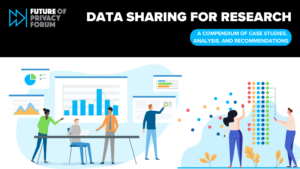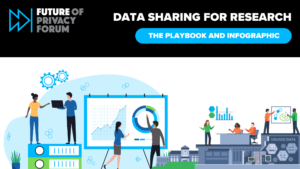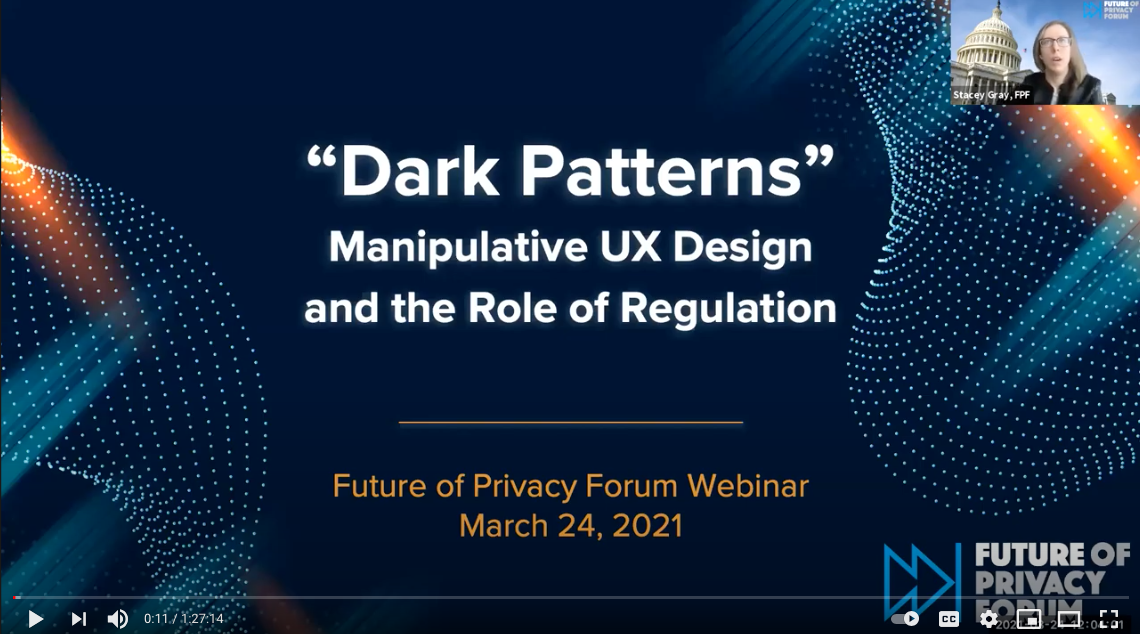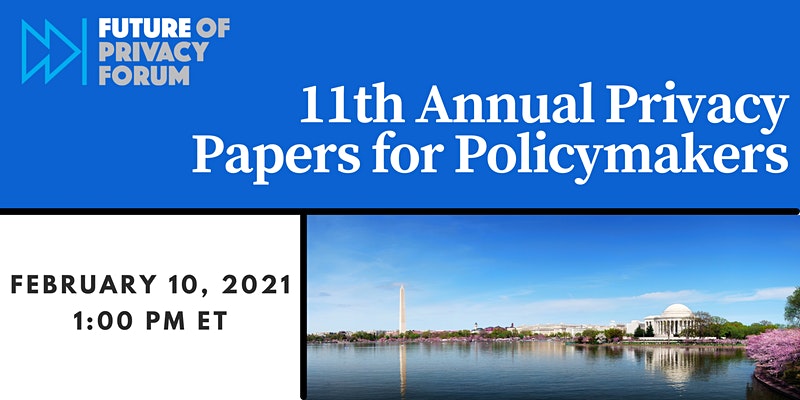Research often requires using sensitive data to answer important questions. The ethical collection and analysis of personal information can be challenging to do while still protecting the privacy of the implicated individuals, honoring informed consent, and complying with other legal obligations. The technology, policies, and ethical considerations for researchers are constantly shifting, sometimes making it difficult to keep up. That’s why FPF engages stakeholders across academia and industry to produce recommendations, best practices, and ethical review structures that promote responsible research. Our work is centered around streamlining, encouraging, and promoting responsible research that respects essential privacy and ethical considerations throughout the research lifecycle. FPF works with policymakers to develop legislative protections that support effective, responsible research with strong privacy safeguards, including hosting events that allow policymakers and regulators to engage directly with practitioners from academia, advocacy, and industry.
FPF also has an Ethics and Data in Research Working Group. This group receives late-breaking analysis of emerging legislation affecting research and data, meets to discuss the ethical and technological challenges of conducting research, and collaborates to create best practices to protect privacy, decrease risk, and increase data sharing for research, partnerships, and infrastructure. Learn more and join here.
Featured
Automated Decision-Making Systems: Considerations for State Policymakers
In legislatures across the United States, state lawmakers are introducing proposals to govern the uses of automated decision-making systems (ADS) in record numbers. In contrast to comprehensive privacy bills that would regulate collection and use of personal information, automated decision-making system (ADS) bills in 2021 specifically seek to address increasing concerns about racial bias or […]
FPF Ethical Data Use Committee will Support Research Relying on Private Sector Data
FPF has launched an independent ethical review committee to provide oversight for research projects that rely upon sharing of corporate data with researchers. Whether researchers are studying the impact of platforms on society, supporting evidence based policymaking, or understanding issues from COVID to climate change, personal data held by companies is increasingly essential to advancing scientific knowledge.
FPF Report Outlines Opportunities to Mitigate the Privacy Risks of AR & VR Technologies
A new report from the Future of Privacy Forum (FPF), Augmented Reality + Virtual Reality: Privacy & Autonomy Considerations in Emerging, Immersive Digital Worlds, provides recommendations to address the privacy risks of augmented reality (AR) and virtual reality (VR) technologies. The vast amount of sensitive personal information collected by AR and VR technologies creates serious risks […]
Supporting Responsible Research and Data Protection
Scientific research is often dependent on access to personal information, whether collected directly from individuals or collected for a real-world use and then accessed for research. For research to be trusted, processing of personal information must be lawful, ethical and subject to privacy and security protections. Supporting responsible research is a priority for FPF: Data […]
Manipulative UX Design & the Role of Regulation: Event Highlights
On March 24, the FPF hosted “Dark Patterns:” Manipulative UX Design and the Role of Regulation. So-called “dark patterns” are user interface design choices that benefit an online service by coercing, manipulative, or deceiving users into making unintended or potentially harmful decisions. The event provided a critical examination of the ways in which manipulative interfaces can […]
Acting FTC Chairwoman Slaughter Highlights Priorities in Privacy Papers for Policymakers Event Keynote
The Future of Privacy Forum’s 11th-annual Privacy Papers for Policymakers event – the first event in the series to take place virtually – was a success! This year’s event featured a keynote speech by Acting FTC Chairwoman Rebecca Kelly Slaughter and facilitated discussions between the winning authors – Amy B. Cyphert, Clarisse Girot, Brittan Heller, Tiffany C. […]
FPF Seeks Nominations for 2021 Research Data Stewardship Award
The Call for Nominations for the 2021 FPF Award for Research Data Stewardship is now open. You can find the nominations forms here. We ask that nominations be submitted by Monday, March 1, 2021. The FPF Award for Research Data Stewardship recognizes excellence in the privacy-protective stewardship of corporate data that is shared with academic researchers. […]
FPF Health and AI & Ethics Policy Counsels Present a Scientific Position at ICML 2020 and at 2020 CCSQ World Usability Day
On November 12, 2020, FPF Policy Counsels Drs. Rachele Hendricks-Sturrup and Sara Jordan presented privacy-by-design alongside human-centered design concepts during the 2020 CCSQ World Usability Day virtual conference. This presentation followed Drs. Hendricks-Sturrup’s and Jordan’s July 2020 scientific position paper presented at the International Conference on Machine Learning (ICML) 2020, entitled “Patient- Reported Outcomes: A Privacy-Centric and Federated Approach […]
2020 Brussels Privacy Symposium
The 2020 Brussels Privacy Symposium is the fourth-annual academic program jointly presented by the Brussels Privacy Hub of Vrije Universiteit Brussel (VUB) and the Future of Privacy Forum (FPF) and is a global convening of practical, applicable, substantive privacy research and scholarship. On December 2, 2020, the fourth iteration of the Brussels Privacy Symposium, “Research and the Protection of […]
FPF Best Practices and Contract Guidelines Help Companies Share Data with Academic Researchers
Does your company have data that could help academic researchers unravel the mysteries of human health, behavior, education, or other areas of study? Data held by private organizations has the potential to lead to scientific insights that can benefit society and improve lives – if it can be accessed in a responsible manner that respects […]















